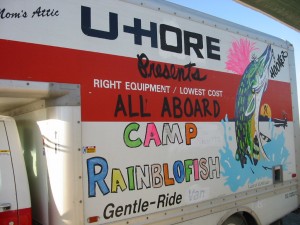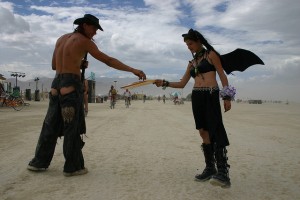
Decommodification, Our lives can feel fully commercialized — advertising surrounds us, from logos on the clothing we wear to advertisements so pervasive they even appear in bathroom stalls. Not only do people take part in a commercialized world, they sometimes even craft their identity from their shopping choices (Android vs. iPhone, anyone?). People are even encouraged to market their “personal brand.”
Subcultures and counterculture are especially susceptible to being co-opted and commercialized as marketers and coolhunters look for the latest youth trends to capitalize on in a process that has gone on since well before the 1960’s — according to the book Counterculture Through the Ages by R. U. Sirius and Dan Joy, the automotive industry borrowed the term “tripping out” for use in ad copy as early as 1967. Though commercialization does not necessarily destroy subcultures, it can interfere with participants’ ability to experience them with complete immediacy.
Thus far, the Burning Man community has largely resisted commercialization through a dedication to the principle of decommodification, a dedication that it acts on through both social and legal means. Socially, Burners work to hide logos on rented trucks and enforce the commerce free, gift economy nature of their event through education and peer pressure. Legally, the BMORG (and similar regional organizers) enforce decommodification by carefully policing the use of logo, name, and even photos from the events. This has included successful lawsuits against groups like Girls Gone Wild, who would have exploited female participants for profit. Ideally, Burners use this increased awareness to make more knowing choices when they return to the commercially saturated default world.
In 2007 the BMORG made the controversial decision to allow certain environmental organizations to display their products in a special pavilion near the effigy as part of that year’s Green Man theme. It was that same year that Paul Addis made an even more controversial attempt to burn the effigy early, at least partly in protest to the weight given to this corporate logo, an act for which he was charged with felony arson.
The Lexicographer has been soliciting opinions from other thoughtful Burners on the Ten Principles. Below you will find another opinion, but more are still welcomed. Use the contact information at the top to send your thoughts.
For more entries in A Burner Lexicon, visit https://kitoconnell.com/lexicon/
